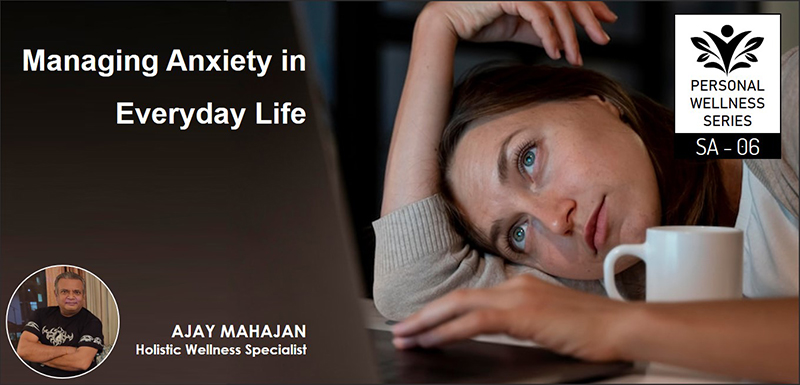
Anxiety is a common and natural part of the human experience, often arising in response to life’s challenges. However, when anxiety becomes overwhelming and pervasive, it can significantly impact our personal wellbeing and daily functioning.
Let us explore effective strategies for managing anxiety in everyday life. From practical lifestyle changes to cognitive-behavioural techniques, these approaches aim to empower individuals to navigate anxiety and foster a sense of calm and resilience.
Understanding Anxiety
- The Nature of AnxietyAnxiety is a complex emotional state characterized by feelings of apprehension, worry, and tension. While it can serve as a normal response to stress, chronic anxiety can interfere with daily life and contribute to a range of physical and mental health issues.
- Types of Anxiety DisordersAnxiety disorders encompass various conditions, including generalized anxiety disorder (GAD), social anxiety disorder, panic disorder, and specific phobias. Understanding the specific nature of one’s anxiety is crucial for developing tailored management strategies.
Lifestyle Strategies for Anxiety Management
1. Prioritize Sleep
Quality sleep is foundational for mental health. Establish a consistent sleep routine, create a comfortable sleep environment, and limit caffeine and screen time before bedtime to promote restful sleep.
2. Regular Exercise
Physical activity is a potent stress reliever. Engage in regular exercise, whether it’s a brisk walk, yoga, or a workout routine. Exercise releases endorphins, which are natural mood lifters.
3. Healthy Nutrition
Maintain a balanced and nutritious diet. Certain foods, such as those rich in omega-3 fatty acids and antioxidants, may have mood-stabilizing properties. Limit the intake of caffeine and sugar, as they can exacerbate anxiety symptoms.
4. Limit Stimulants and Screen Time
Reduce the consumption of stimulants like caffeine and be mindful of excessive screen time, especially on social media. Setting boundaries with technology can contribute to a calmer mental state.
5. Practice Mindfulness and Meditation
Incorporate mindfulness and meditation into your daily routine. These practices help cultivate a present-focused awareness that can mitigate anxiety by reducing excessive worry about the future.
Cognitive-Behavioral Strategies
1. Identify and Challenge Negative Thoughts
Cognitive-behavioral therapy (CBT) is effective for anxiety management. Begin by identifying negative thought patterns, then challenge and reframe them. Replace irrational thoughts with more balanced and realistic ones.
2. Gradual Exposure
For specific phobias or anxieties, consider gradual exposure. Start with small, manageable steps to confront feared situations or objects, gradually increasing exposure over time. This helps build resilience and reduces avoidance behaviours.
3. Mind-Body Techniques
Incorporate mind-body techniques such as deep breathing exercises, progressive muscle relaxation, or guided imagery. These techniques promote relaxation and can be practised whenever anxiety arises.
4. Establish a Routine
Structure and routine provide a sense of predictability, which can be comforting for individuals dealing with anxiety. Establishing a daily routine helps create a stable environment and reduces uncertainty.
5. Set Realistic Goals
Break down tasks into smaller, achievable goals. Setting realistic objectives reduces the likelihood of feeling overwhelmed and fosters a sense of accomplishment.
Social Support and Professional Help
1. Connect with Others
Social support is a powerful buffer against anxiety. Share your feelings with trusted friends or family members. Sometimes, expressing worries aloud can provide a fresh perspective.
2. Professional Counseling
Consider seeking professional help from a therapist or counsellor. Therapy provides a safe space to explore the roots of anxiety, develop coping strategies, and gain valuable insights into one’s mental health.
3. Medication Management
In certain cases, medication may be prescribed to manage anxiety symptoms. Consult with a healthcare professional to explore medication options and discuss potential benefits and side effects.
Strategies for Anxiety at Work
1. Time Management
Break tasks into smaller, manageable components and prioritize them. Effective time management can reduce the pressure associated with looming deadlines.
2. Set Boundaries
Establish clear boundaries between work and personal life. Avoid overcommitting and communicate realistic timelines with colleagues to manage expectations.
3. Practice Stress Reduction Techniques
Incorporate stress reduction techniques into your workday. Brief mindfulness exercises, short walks, or deep breathing can be done discreetly and contribute to a calmer mindset.
Conclusion
Managing anxiety in everyday life is a multifaceted endeavour that requires a holistic approach. By integrating lifestyle changes, cognitive-behavioural strategies, and seeking support when needed, individuals can effectively navigate anxiety and cultivate a greater sense of well-being.
It’s important to recognize that everyone’s experience with anxiety is unique, and there is no one-size-fits-all solution. Experiment with different strategies, and tailor your approach to suit your individual needs.
With time, patience, and a proactive mindset, it’s possible to build resilience and lead a fulfilling life even in the face of anxiety. Remember, seeking professional guidance is a sign of strength, and there is support available for those navigating the challenges of anxiety.
Ajay Mahajan | Holistic Wellness Specialist
Founder & CEO – Wellness Seekers Academy
+91 96548 89815 | ajm@ajaymahajan.info
